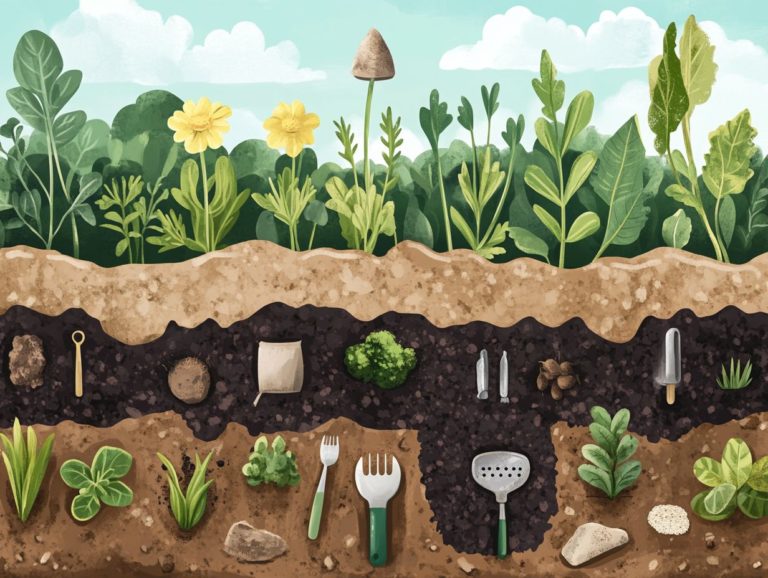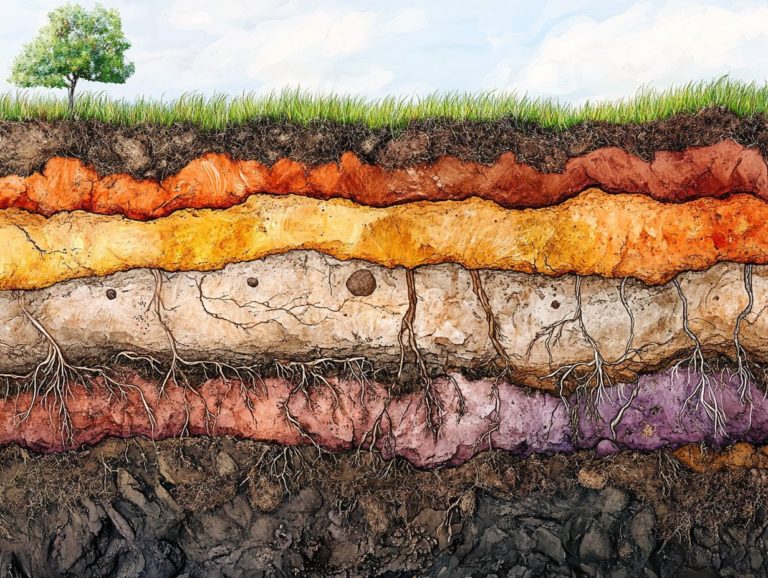The Role of Microorganisms in Soil Health
Soil health serves as the cornerstone of vibrant ecosystems and sustainable agriculture. Often overlooked, the intricate world of soil microbes plays a critical role in maintaining this health.
From enhancing nutrient availability to supporting crop growth, these tiny organisms are the unsung heroes of soil. This article delves into the importance of soil health, the various types of beneficial microbes that inhabit it, their essential functions, and the factors that influence them.
You ll discover practical ways to promote microbial activity, ensuring a thriving and resilient environment. By nurturing soil health, you can contribute to a healthier planet.
Contents
Key Takeaways:

- Microorganisms help maintain soil health by improving soil structure, nutrient availability, and enhancing plant growth.
- Soil health is essential for sustainable agriculture and food production. Microorganisms contribute to this by promoting nutrient cycling (the process by which nutrients are reused in the ecosystem) and increasing soil resilience against environmental pressures.
- Factors such as land use practices and climate change can impact microbial diversity and abundance, highlighting the need for sustainable management practices that support their growth and function.
The Importance of Soil Health
Soil health is crucial for agricultural sustainability and productivity. It directly affects nutrient cycling and nurtures diverse groups of tiny organisms, delivering vital ecosystem services that bolster crop growth and resilience.
When soil is healthy, it maintains an optimal balance of organic matter, encourages beneficial microbes, and enhances water retention. These factors contribute to increased yields and improved food security.
This clearly shows why we must implement effective soil management practices that conserve resources, prevent erosion, and support the overall vitality of agricultural systems for future generations.
Why Soil Health Matters
Soil health is essential for elevating crop performance and ensuring sustainable agricultural practices that benefit both environmental health and food security.
When you prioritize soil health, you’re not just increasing the productivity of your crops; you’re also enhancing nutrient availability, which directly impacts the quality and yield of your produce. Healthy soils cultivate rich microbial diversity, playing a vital role in breaking down organic matter and facilitating nutrient cycling.
With well-structured soil, you can improve water retention and aeration, which helps reduce erosion and bolsters the resilience of the entire ecosystem.
Soil health supports natural pest control dynamics, reducing the need for chemical interventions and making your farming practices more sustainable in the long run.
What are Microorganisms?
Microorganisms, such as bacteria, fungi, and various soil microbes, play essential roles in the soil ecosystem. By facilitating key processes like decomposition, nutrient cycling, and the enhancement of organic matter, they significantly contribute to overall soil health and fertility.
Understanding these interactions underscores the importance of nurturing a vibrant microbial community in your sustainable soil management practices.
Types of Microorganisms in Soil

In soil, the primary types of microorganisms include bacteria, fungi, and archaea, each playing a vital role in enhancing soil health through their beneficial interactions and diverse functions.
Bacteria act as prolific decomposers, breaking down organic matter and releasing essential nutrients back into the soil, which boosts overall fertility. Fungi enhance this process by forming symbiotic relationships with plant roots, improving water and nutrient uptake while fostering a more resilient ecosystem.
Although archaea may not be as widely studied, they play a crucial role in nutrient cycling, especially in extreme conditions. The diversity among these microorganisms not only improves nutrient availability but also promotes crop growth by encouraging healthy root systems and suppressing pathogens.
By understanding their roles, you can adopt better agricultural practices that sustain and enrich soil health.
The Role of Microorganisms in Soil Health
Microorganisms are essential to maintaining soil health, performing pivotal functions such as nutrient cycling, decomposing organic matter, and establishing relationships that help plants absorb nutrients. Understanding the role of organic matter in soil health is vital for creating a sustainable farming future!
Functions of Microorganisms in Soil
The primary functions of microorganisms in soil revolve around nutrient cycling, decomposition of organic matter, and enhancing soil structure. Together, these processes play a crucial role in improving soil health and fertility, highlighting the role of soil in our ecosystem.
Though often overlooked, these tiny organisms are essential to the ecosystem. For example, bacteria diligently break down complex organic materials into simpler compounds, making nutrients more accessible for your plants.
Meanwhile, fungi, known for their relationships with plant roots, facilitate better nutrient uptake and water retention.
By forming aggregates, these microorganisms enhance soil structure, leading to improved aeration and drainage. Such processes enrich the soil, enhance biodiversity, and promote sustainable agricultural practices, all of which are essential for nurturing a thriving environment.
Factors Affecting Microorganisms in Soil
Numerous factors influence the composition and activity of microorganisms in soil. Key environmental conditions, such as moisture, temperature, and the availability of organic matter, play a crucial role.
Your agricultural practices significantly affect microbial communities and their functions, shaping the intricate web of life beneath your feet.
Environmental and Agricultural Impacts

Environmental impacts like climate change, pollution, and changes in land use can drastically harm the health of soil microorganisms, ultimately influencing the sustainability of agricultural practices.
These factors may lead to a decline in microbial diversity, disrupting the delicate balance that is crucial for soil fertility and plant growth. For instance, increased carbon emissions can alter temperature and moisture patterns, creating conditions that are less than ideal for beneficial microbes.
Additionally, the use of synthetic fertilizers and pesticides disrupts microbial communities and can also cause nutrient runoff, negatively impacting nearby ecosystems.
To combat these adverse effects, you can adopt practices such as:
- Organic farming: Utilizing natural methods to enhance soil health.
- Crop rotation: Alternating crops to improve soil nutrients and health.
- Cover cropping: Planting crops to protect and enrich the soil during off-seasons.
Implementing conservation tillage methods can also help maintain soil structure, thereby fostering a thriving microbial environment.
Improving Soil Health through Microorganisms
Enhancing soil health through microorganisms requires you to adopt a range of methods and practices that foster beneficial microbial activity. This includes utilizing biofertilizers, integrating compost into your routine, and embracing sustainable management techniques.
By doing so, you create an environment where these microorganisms can thrive, ultimately leading to richer, healthier soil.
Start enhancing your soil health today for a greener tomorrow!
Methods for Promoting Microbial Activity
To effectively promote microbial activity in your soil, consider applying biofertilizers, utilizing compost, and implementing conservation practices that enhance soil structure and increase organic matter content. These methods boost the number of beneficial microorganisms and create a healthy ecosystem that supports plant health.
Introduce biofertilizers to supply essential nutrients and beneficial microbes that aid in nutrient absorption and stimulate crop growth. Composting enriches your soil with organic matter, providing a feast for microbes and enhancing nutrient cycling.
By practicing conservation tillage, you minimize soil disturbance, allowing microbial communities to flourish and helping them withstand erosion. Together, these strategies contribute to improved soil health, ensuring sustainable agricultural practices while fostering an environment ripe for ongoing ecosystem services. Act now to enrich your soil with biofertilizers and compost!
Watch this video to learn more about promoting microbial activity in your soil.
Frequently Asked Questions
Here are some common questions about microorganisms and soil health:
1. What is the role of microorganisms in soil health?

Microorganisms play a crucial role in maintaining healthy soil by breaking down organic matter, cycling essential nutrients, and suppressing harmful pathogens, as detailed in the role of microorganisms in soil health.
2. How do microorganisms contribute to nutrient cycling in soil?
Microorganisms decompose organic matter in the soil, releasing essential nutrients such as nitrogen, phosphorus, and potassium, making them available for plant uptake.
3. Can microorganisms improve soil structure?
Yes, microorganisms improve soil structure by creating pore spaces, which allow for better water and air movement, promoting healthy root growth.
4. Do soil microbes have any impact on soil pH?
Yes, certain microorganisms can produce acids or alkaline compounds that can change soil pH, influencing nutrient availability and plant growth.
5. How do microbial interactions affect plant health?
Microorganisms in the soil can form beneficial relationships with plants, promoting growth, increasing nutrient absorption, and protecting against harmful pathogens.
6. Can too many soil microbes be harmful?
While microorganisms are essential for maintaining healthy soil, an imbalance or overabundance of certain species can harm plant growth and lead to disease issues.






